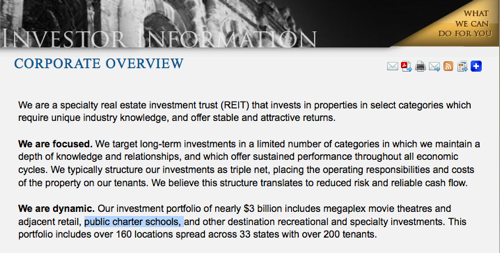Welcome to DU!
The truly grassroots left-of-center political community where regular people, not algorithms, drive the discussions and set the standards.
Join the community:
Create a free account
Support DU (and get rid of ads!):
Become a Star Member
Latest Breaking News
Editorials & Other Articles
General Discussion
The DU Lounge
All Forums
Issue Forums
Culture Forums
Alliance Forums
Region Forums
Support Forums
Help & Search
Education
Related: About this forumOne of the (many) ways "non-profit" charters are profit centers: REITs.
A real estate investment trust or REIT is a tax designation for a corporate entity investing in real estate. The purpose of this designation is to reduce or eliminate corporate tax. In return, REITs are required to distribute 90% of their taxable income into the hands of investors...In the United States, a REIT is a company that owns, and in most cases operates, income-producing real estate. Some REITs finance real estate.http://en.wikipedia.org/wiki/Real_estate_investment_trust
Here's one:

And here's one (pro-charter) analyst's opinion:
I have encountered a few (REITs) in the charter school world as they look for safe, profitable investments for their funds. Virtually all of the REITS with which I have had discussions are looking for equity investments or ownership of the facilities as opposed to granting a mortgage loan... After becoming the owner, they want to enter into a long-term lease with the school tenant with the usual triple net, annual escalator, etc. features normally found in long-term commercial leases.
This means that the school/lessee is responsible for all upkeep, repair, etc. costs associated with ownership but without the ownership. The lease escalators are generally aggressive, being based on a fixed percentage, the consumer price index, or a real estate value index of some sort....
Another cost that the school/lessee is usually responsible for is property taxes. In many states, if the property is owned by a for-profit company, even though the only tenant is a not-for-profit, property tax is due every year. Of course, the cost is passed through to the school tenant. In short, this is one of the most expensive ways for a charter school to occupy a building; they do not build any equity, and they will never own it. Even if a school pays too much for financing the purchase of its facility, at least the payments stay level so that in a few years there is a benefit as opposed to a lease, which never levels the lease payments.
REITS often like to associate themselves with education management companies (“EMO”). This association provides financial benefits to the EMO and the REIT... but as yet, I have not found a benefit for the school to lease its facility from a REIT. There are many of these REIT/EMO partnerships that remind me of a couple of vultures feeding off of an emaciated carcass. I cannot count how many schools have called me about how to get out of a bloated EMO contract and/or similarly bloated lease contract...I have yet to discover a REIT that offers fair value to a charter school when compared to financing a purchase of their facility...
http://www.providencefinancialco.com/Charter-Schools/Charter-Schools-2010/dCharterSchoolInvestors01b.asp
IOW, unlike traditional schools owned by local districts/governments, the graft doesn't stop with the construction of the school. Every year the school is in operation the REIT (& sometimes the associated EMO) suck off a percent of the taxpayer funding -- while still leaving the school responsible for some of the basic expenses districts used to cover.
This isn't hypothetical: this is, for example, the business model of "Imagine" charter schools:
Entertainment Properties Trust EPR -0.48% is learning a tough lesson from its ambitious investment in charter schools. The real-estate investment trust, which is known mainly as a landlord to movie theaters... began expanding into the education business five years ago by buying or building charter schools. The company now owns 37 charter-school buildings, most of which are managed by Imagine Schools, one of the nation's largest for-profit charter-school operators...
Ronald Lankford, deputy commissioner of the Missouri Department of Elementary and Secondary Education, said that Imagine was paying closer to 20% to 25% of the state money on rent and other expenses related to the maintenance of the school facilities.
"It did not appear that sufficient funding was set aside to go directly into school instruction," he said...
http://online.wsj.com/article/SB10001424052702304458604577490651788595174.html